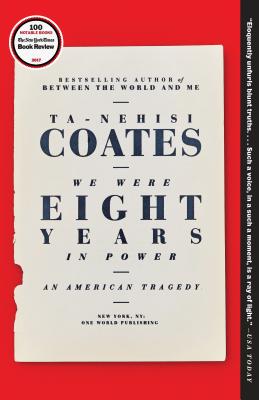Reading Through It: we all love Coates

There were no dissenters in last night's meeting of the Reading Through It book club. We discussed Ta-Nehisi Coates We Were Eight Years in Power: An American Tragedy. The collection of essays, one from each year of the Obama presidency, paired with retrospective pieces giving context to, and commenting on, the original essays, is a powerful and rich read. All in attendance were quite taken by the book, which is unusual in our group, which nearly always has at least one dissenter.
We talked quite a bit about Coates' power as a prose stylist, his ability to frame an argument, his insight into systems of power, and their cascading effects on black Americans. Coates' background as a blogger, digging deep into the oft forgotten (or deliberately recast) history of the Civil War, gave him a runway at the beginning of the Obama presidency to frame such a historical president in a starkly historical context. One member talked about never putting it together before, until Coates pointed it out, that Obama's presidency created an editorial and public thirst for African-American perspectives that launched the careers of a new school of social and political critics: Coates, Jamelle Bouie, Gene Demby, just to name a few.
We spent a bit of time — a slim amount, in proportion to its historical importance — on "The Case for Reparations", the essay that launched Coates from a well-known political writer, to a famous writer. We touched on how clear and unassailable his argument was, how focusing its lens on living Americans who were so clearly cheated and swindled, moved the argument for reparations from something removed from a time period white America doesn't understand, to something modern, cruel, and difficult to argue with.
One member read a quote from the essay we spent some time with:
Perhaps the number is so large that it can't be imagined, let alone calculated and dispensed. But I believe that wrestling publicly with these questions matters as much as — if not more than — the specific answers that might be produced. An America that asks what it woes its most vulnerable citizens is improved and humane. An America that looks away is ignoring not just the sins of the past but the sins of the present and the certain sins of the future. More important than any single check cut to any African American, the payment of reparations would represent America's maturation out of the childhood myth of its innocence into a wisdom worthy of its founders.
The essay that garnered the second-most attention was "The Black Family in the Age of Mass Incarceration." Many books, in the over-three year history of our book club, have been painful and difficult to read. But this essay was very affecting to many of our members, who struggled to find meaning in the absolute cruelty of the system Coates so cogently unpacks. The cruelty is the point, after all, not rehabilitation.
Coates' relationship with Obama was a narrative arc told mostly in the commentary on the essays in the book, and it was moving to see a sharp-eyed critic also so admire and work at understanding the target of his criticism. When Coates gained access to Obama, first in off-the-record meetings where they would discuss a wide range of topics, his admiration for the man, even when he was disappointed by his actions or policies, was palpable. Obama has a towering intellect, and Coates took a while to find his own comfort when verbally sparring with the president.
His sharpest critique, for some in our group, was when the administration caved and fired Shirley Sherrod, after video-taped comments she made to the NAACP were re-cut so that it appeared she was saying something opposite of what she actually was. Obama, or his people, reacted knee-jerk to the right wing campaign, firing Sherrod before she had a chance to defend herself. Coates goes deep into Sherrod's past, what drove her to her post at the USDS, after years of activism and civil rights labor. He goes into her family history — her father was shot dead by a white neighbor, who refused to return charges, and a cross was burned on her family's lawn soon after — and how she dedicated her life to improving conditions in the south. The context he gives in his essay makes Obama's decision appear weak, feckless, and cruel, an untrue smear campaign taking down a woman who earned her position many times over.
This book will stand tall on the shelf, compared to many of the other's we have read during the past three years of the club. If you want to understand Obama, the effects of his presidency, and a good-faith critique of his policies, and the cultural context of black America during those years, Coates is every bit as good as his reputation might suggest.
Reading Through It will be back next month, on Wednesday, March 4th, at Third Place Books' Seward Park location. We'll be reading Rebecca Traister's Good and Mad which is 20% at the store for the next month. Grab your copy, and come on down to discuss it.
This will be the last book we cover. After March, we're going to discontinue the club. We've had an amazing run over the past three years, and learned so much from the people who came and shared and learned with us. We're grateful to you all for the opportunity, and to Third Place Books for giving us the forum. It would be fun to have a banner month to celebrate, so please do come if you can.